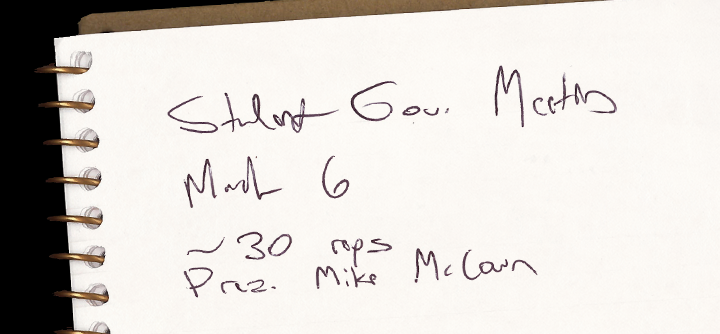
Tsang’s notes from the meeting.
Inside Student Government
Scenes from Student Government’s last full assembly meeting of winter quarter.
The University’s Student Government (SG) meets with its full assembly—the cabinet plus members from the College and Graduate Councils, respectively—roughly once a month to vote on everything from Recognized Student Organization (RSO) finances to committee members and amendments. One of this intern’s former housemates needed a proxy to vote on her behalf at SG’s March 6 Assembly. Here’s a catalog of my two hours of democratic power.
5:30 p.m.
Thirty representatives, proxies, officials, and spectators are in a really, really nice lecture hall in Booth’s basement, with Greek columns, wooden tabletops, and spinning chairs. A lanky Asian undergraduate eats Harold’s chicken loudly behind me. The assembly is intimidatingly better dressed than what I’m used to seeing on campus.
5:33 p.m.
President Michael McCown, ’14, calls the meeting to order with a series of parliamentary procedures. “Motion to call meeting to order ... motion to vote ... motion to amend the resolution ... .”
5:33–5:46 p.m.
A variety of acronymed entities confirm that the wheels of this bureaucracy are in forward motion: the Disabilities Pilot Program (DPP), the Sexual Assault Committee (SAC), the Committee on RSOs (CORSO), and the Graduate Council are all in the midst of multiweek decision-making processes.
5:46 p.m.
Somebody brings in three pizzas—one with pine nuts!—and two salads from Pizza Capri. We break.
5:58 p.m.
Tyler Kissinger—SG’s community and government liaison—presents a proposal to allow SG to directly appoint a student to the Independent Review Committee (IRC) of the University of Chicago Police Department (UCPD), which makes policy recommendations to the University about its sometimes-controversial private police force. Currently, says Kissinger, the University’s administrators “don’t have any written criteria for how they select the student.” It seems like a pretty cut-and-dry issue of impartiality, so discussion is tepid. The petition passes, 15 in favor, one opposed, and four abstaining.
6:03 p.m.
Ava Benezra, from the Coalition for Equitable Policing, is there to answer questions about the UCPD petition. She talks through the petition, which recommends the UCPD release their rules and regulations, simplify their complaint process, and establish a system to release information.
6:15 p.m.
The room comes alive, first with questions to Benezra, then with debate. Martinez asks that the Graduate Council vote separately; the UCPD treats graduate students—who live mostly off-campus—as community members, he says; undergraduates living in dorms have a friendlier UCPD experience. Plus, only two of the 27 members of the Graduate Council are present. Not everybody thinks it’s appropriate for Student Government to lend their support to the petition: Mike Viola, chair of College Council, says he’s not sure.
6:25 p.m.
Martinez questions whether this is a University or a community issue, and then what it even means for this particular collection of SG members to vote on a petition: “In six months, we won’t be in these positions. If we adopt this, in three months, and what was the point of the petition?” And Jane Huber, vice president for student affairs, pokes fun at him for being nihilist. “It’s great to think of it on a theoretical level, what does it mean for College Council to vote on something? For like two minutes.” This is an opportunity, she argues, for SG to do its duty as the students’ representative body. Ione Barrows, from the College Council, agrees. “If even one student has been wronged by the UCPD, we should approve this petition,” she says.
6:30 p.m.
Nobody’s coming to the defense of the UCPD; the main dissent seems to be that approving the petition on such short notice is impetuous; the Coalition for Equitable Policing is delivering their petition to the University the next day. Benzera emphasizes that the petition is about getting the information that dissenters say they’d need, tautologically, to approve the petition. “It’s an issue of transparency,” she says.
6:35 p.m.
I realize that I have to vote on a somewhat contentious issue.
6:42 p.m.
SG’s social consciousness prevails, voting to support the petition with 15 out of 21 in favor.
6:44 p.m.
The rest of the meeting is a sort of denouement. President McCown leads us through voting on four nominees for the Elections and Rules Committee; the cabinet has vetted them thoroughly. They make nice speeches and then we approve them all unanimously.
6:50 p.m.
Sofia Flores, SG’s vice president for administration, asks for nominations for the Annual Allocations Committee, which doles out $400,000+ among student organizations. Awkward silence descends.
6:53 p.m.
Four representatives step up to their civic duty after Flores stresses that SG needs nominees, immediately. We also hear from the Coalition of Academic Teams (CAT), which coordinates debate, Model UN, and the like. These competitions are important for prestige, says Flores.
7:09 p.m.
Martinez asks for volunteers for SG’s quarterly shuttles to O’Hare and Midway Airports to help load the shuttles with students’ suitcases. “You may or may not have noticed, a lot of students can’t lift that much weight,” he says. “It’s part of the charm of our student body.”
